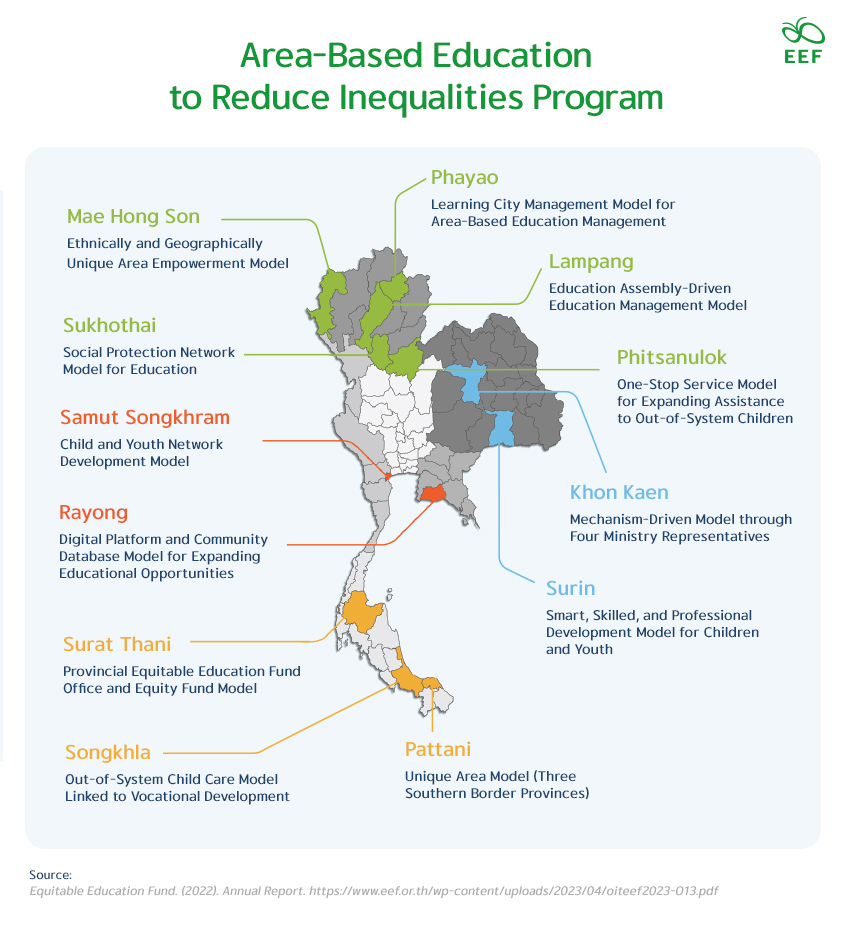
In many cases, children and youth are forced to abandon their education due to various reasons and circumstances. While the Equitable Education Fund (EEF) Thailand offers some support, it is crucial to adopt a localized approach to effectively reduce educational inequality. By implementing initiatives at the provincial level, targeted assistance can be provided to children and youth, reducing intervention time and efficiently allocating resources to address local education issues.
This led to the establishment of the Area-Based Education to Reduce Inequalities Program, which serves as a key initiative in tackling educational inequality from the local to provincial levels. The project focuses on developing tailored mechanisms to address specific challenges in each area, fostering robust collaboration in information, knowledge, and resource management. Its ultimate goal is to achieve far-reaching policy outcomes and create a compelling impact.

Launched in 2019, the Area-Based Education to Reduce Inequalities Program is designed to tackle educational inequality through customized interventions at the provincial level. It particularly emphasizes the needs of marginalized groups, including preschool children, out-of-school youth, and individuals with disabilities. The project places significant importance on the effective management of resources and knowledge, adapting approaches to address the unique challenges faced in each area.
To ensure comprehensive implementation, the project fosters collaboration at both the national and provincial levels. At the national level, various government ministries and supporting agencies join forces, while at the provincial level, government bodies, local authorities, private sector organizations, and civil society organizations work together to drive the project’s implementation. This united front of diverse stakeholders brings remarkable depth and breadth to the project’s reach and impact.

Establishing an inclusive and comprehensive development framework is critical in providing support to underprivileged children and youth. A key aspect of this framework is the creation of a robust data and knowledge system, which leverages data from the EEF and expands provincial databases. In this process, case managers representing diverse sectors play a crucial role in identifying and assisting target groups. These case managers possess firsthand knowledge and connections, enabling them to devise innovative approaches, raise awareness, validate data, conduct research, and monitor assistance plans. By adopting this decentralized structure, the project ensures effective implementation and facilitates future expansion, ultimately promoting equitable education opportunities.
To strengthen education management at the provincial level, it is essential to develop a dedicated mechanism that establishes a solid infrastructure for implementing initiatives. This involves designing favorable conditions for project proposals and coordinating collaborative efforts among the EEF, provincial agencies, and external organizations at the local level. One of the primary objectives is the establishment of comprehensive province-specific database systems, enabling targeted assistance, facilitating effective communication, and yielding valuable insights. By placing emphasis on data-driven decision-making and fostering collaboration within provinces, this approach reinforces the project’s commitment to achieving educational equity through strategic management.
Noteworthy achievements of the Area-Based Education to Reduce Inequalities Program include the establishment of 12 initial mechanisms for area-based equitable education management and the expansion of knowledge utilization through collaborative provincial challenges. These models empower disadvantaged children and youth, reducing educational inequality and promoting equity at the provincial and local levels. Looking ahead, the project aims to expand its impact nationwide, extending its reach to benefit even more individuals.

- Mae Hong Son – Ethnically and Geographically Unique Area Empowerment Model
- Sukhothai – Social Protection Network Model for Education
- Samut Songkhram – Child and Youth Network Development Model
- Rayong – Digital Platform and Community Database Model for Expanding Educational Opportunities
- Surat Thani – Provincial Equitable Education Fund Office and Equity Fund Model
- Phayao – Learning City Management Model for Area-Based Education Management
- Pattani – Unique Area Model (Three Southern Border Provinces)
- Lampang – Education Assembly-Driven Education Management Model
- Phitsanulok – One-Stop Service Model for Expanding Assistance to Out-of-System Children
- Khon Kaen – Mechanism-Driven Model through Four Ministry Representatives
- Surin – Smart, Skilled, and Professional Development Model for Children and Youth
- Songkhla – Out-of-System Child Care Model Linked to Vocational Development
Building upon its success, the project has expanded its scope to enhance mechanisms, data systems, and knowledge for sustainable interventions. It has identified 5 crucial focal points:
- The development of area-based education management mechanisms
- Improvement of data systems to facilitate localized interventions
- Raising awareness and addressing issues of educational inequality
- Exploring and implementing innovative models to diminish educational disparities
- Promoting long-term provincial development plans that optimize resource allocation for the benefit of target groups.
This comprehensive endeavor seeks to create a cohesive, impactful, and equitable educational landscape for all individuals, regardless of their backgrounds or circumstances.
The Area-Based Education to Reduce Inequalities Program serves as a testament to comprehensive integration and organizational collaboration. It successfully intertwines activities within local contexts, addressing the specific needs of individuals across all age groups. By fostering collaboration between stakeholders at the provincial and national levels, the project creates a platform for sharing expertise, resources, and best practices.
Source: Equitable Education Fund. (2022). Annual Report.
https://www.eef.or.th/wp-content/uploads/2023/04/oiteef2023-O13.pdf

